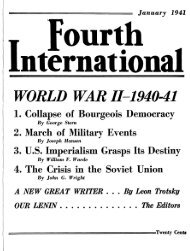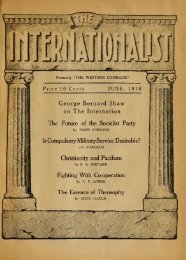National Liberation Movements and the Question of Socialism ...
National Liberation Movements and the Question of Socialism ...
National Liberation Movements and the Question of Socialism ...
Create successful ePaper yourself
Turn your PDF publications into a flip-book with our unique Google optimized e-Paper software.
we merely want to demonstrate that unless one argues<br />
from a working class point <strong>of</strong> view <strong>and</strong> underst<strong>and</strong>s<br />
imperialism in class terms as oppos~d to merely<br />
national relationships, <strong>the</strong> conclus1ons reached<br />
are supportive <strong>of</strong> imperialism <strong>and</strong> represent a petty<br />
bourgeois--capitalist--position. Whe~her <strong>the</strong> central<br />
point is that <strong>of</strong> unequal exchange, th1rd world, superpowers<br />
or center-periphery,.th: gen:ral <strong>the</strong>ory surrounding<br />
<strong>the</strong> particular var1at1on w1ll be <strong>the</strong> same<br />
in essence--pro-imperialist.<br />
<strong>National</strong>ist Theories <strong>of</strong><br />
<strong>National</strong> <strong>Liberation</strong><br />
Examining social processes from <strong>the</strong> st<strong>and</strong>point <strong>of</strong><br />
<strong>the</strong> nation, it appears to many <strong>the</strong>orists that all those<br />
in <strong>the</strong> imperialist country have an object~ve interes~<br />
in continuing <strong>the</strong> oppression <strong>of</strong> <strong>the</strong> colon1al populat1ons.<br />
As evidence for this position, it is noted that workers<br />
in <strong>the</strong> capitalist powers have higher incomes, etc., than<br />
most <strong>of</strong> <strong>the</strong> colonial peoples. Thus, it is reasoned that<br />
workers in <strong>the</strong> imperialist countries have an interest<br />
in exploiting <strong>the</strong> colonies because this exploitation<br />
serves as <strong>the</strong> basis for <strong>the</strong>ir incomes. Hence, workers<br />
are bribed <strong>and</strong> thus corrupted; <strong>the</strong>y become <strong>the</strong> allies<br />
<strong>of</strong> <strong>the</strong> capitalists. (For our criticism <strong>of</strong> <strong>the</strong> bribe<br />
<strong>the</strong>ory, see Science, Class, <strong>and</strong> Politics, #10.) .<br />
This bribe, though does not stop at <strong>the</strong> front1ers<br />
<strong>of</strong> <strong>the</strong> imperialist nation; it extends into <strong>the</strong> colony<br />
itself. It is observed that workers in <strong>the</strong> urban<br />
areas <strong>of</strong> <strong>the</strong> colonies have higher incomes than <strong>the</strong>ir<br />
fellow citizens in <strong>the</strong> country (<strong>the</strong> writings <strong>of</strong> many<br />
<strong>of</strong> <strong>the</strong>se <strong>the</strong>orists display a distinctly anti-town<br />
bias). Thus, as with <strong>the</strong> "evidence" cited in <strong>the</strong><br />
imperialist country, <strong>the</strong> fact <strong>of</strong> higher in~omes<br />
"proves" that this colonial working class 1s hopelessly<br />
mired in <strong>the</strong> machinations <strong>of</strong> imperialism <strong>and</strong>,<br />
<strong>the</strong>refore, cannot serve as a revolutionary focal<br />
point. It tends, in fact, to be conservative.<br />
The great mistake, <strong>the</strong> inherent defect in<br />
<strong>the</strong> majority <strong>of</strong> political parties in underdeveloped<br />
regions has been, following traditional<br />
lines, to approach in <strong>the</strong> first place<br />
those elements which are <strong>the</strong> most politically<br />
conscious: <strong>the</strong> working-classes in <strong>the</strong> towns,<br />
<strong>the</strong> skilled workers <strong>and</strong> <strong>the</strong> civil servants-<br />
that is to say, a tiny portion <strong>of</strong> <strong>the</strong> population,<br />
which hardly represents more than one<br />
per cent.<br />
But although this proletariat has read<br />
<strong>the</strong> party publications <strong>and</strong> understood its<br />
propag<strong>and</strong>a, it is much less ready to obey<br />
in <strong>the</strong> event <strong>of</strong> orders being given which<br />
set in motion <strong>the</strong> fierce struggle for national<br />
liberation. It cannot be too strongly stressed<br />
that in <strong>the</strong> colonial territories <strong>the</strong> proletariat<br />
is <strong>the</strong> nucleus <strong>of</strong> <strong>the</strong> colonised population<br />
which has been most pampered by <strong>the</strong> colonial<br />
regime. The embryonic proletariat <strong>of</strong> <strong>the</strong><br />
towns is in a comparatively privileged position.<br />
(Fanon, The t~retched <strong>of</strong> <strong>the</strong> Earth, p. 88.)<br />
Since <strong>the</strong> working class is rejected as <strong>the</strong> leading<br />
revolutionary force, <strong>the</strong>n who serves in this role?<br />
The peasantry is systematically disregarded<br />
for <strong>the</strong> most part by <strong>the</strong> propag<strong>and</strong>a put out<br />
by <strong>the</strong> nationalist parties. And it is clear<br />
that in <strong>the</strong> colonial countries <strong>the</strong> peasants<br />
alone are revolutionary, for <strong>the</strong>y have nothing<br />
to lose <strong>and</strong> everything to gain. The starving<br />
peasant, outside <strong>the</strong> class system, is <strong>the</strong><br />
first among <strong>the</strong> exploited to discover that<br />
only violence pays.<br />
[The] ... peasantry precisely constitutes <strong>the</strong><br />
only spontaneously revolutionary force <strong>of</strong><br />
<strong>the</strong> country ...<br />
... <strong>the</strong> peasants, who are all <strong>the</strong> time adding<br />
16<br />
17
















